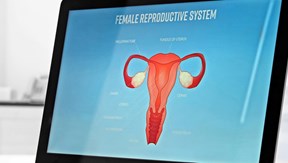Tubal disease
Tubal disease accounts for around 20% of female infertility, but fortunately it can be treated with IVF.

What is tubal disease?
Tubal disease occurs when the fallopian tubes are blocked or damaged. This prevents the egg from travelling down the fallopian tube to meet and be fertilised by the sperm.
What causes tubal disease?
Many cases of tubal disease are caused by infection such as pelvic inflammatory disease (PID), appendicitis and peritonitis. Other causes of tubal disease are endometriosis and adhesions, which may separate the fallopian tube from the ovary. Occasionally scarring from surgery can damage fallopian tubes, or they are removed due to ectopic pregnancy or another reason. In some cases, the fallopian tube has been deliberately severed for contraceptive reasons, or a woman may simply have been born without fallopian tubes.
What are tubal disease symptoms?
Some women with blocked/damaged tubes experience symptoms while others do not. Possible symptoms include abdominal pain, fever, unusual vaginal discharge and pain when menstruating/urinating/having sex. Tubal patency can be tested with hysterosalpingogram, or HyCoSy, when dye is injected into the uterus and tracked as it enters the fallopian tubes. This is sometimes provided on the NHS, and we also offer this service at our clinic.
How does tubal disease affect fertility?
When the egg is released from the ovary, it travels down the fallopian tube to the uterus, where it combines with the sperm. If the fallopian tube is blocked or absent then the egg is unable to travel to the uterus and therefore cannot be fertilised.
Can IVF treat infertility issues caused by tubal disease?
The most common treatment for tubal disease is IVF where the eggs are removed from the ovaries and fertilised outside the body. IVF is the fertility treatment we offer for patients with tubal disease, as the eggs need to be removed from the ovaries in order to be fertilised.
Our IVF treatments use the principle of natural selection to collect the highest quality eggs, rather than quantity. Using lower doses of drugs our aim is to provide woman-friendly treatment with improved health outcomes for both mother and baby.
The treatment that’s right for you depends upon various factors such as your age and ovarian reserve but one of our doctors will be able to advise you on the best treatment option and devise a tailor-made treatment plan on the basis of a scan and your medical history.
Your Stories
Read the latest stories, advice and news on Vitanova

19 FEBRUARY 2024

28 JULY 2023

27 JANUARY 2021

27 JANUARY 2021

27 JANUARY 2021

27 JANUARY 2021

27 JANUARY 2021

27 JANUARY 2021

27 JANUARY 2021


